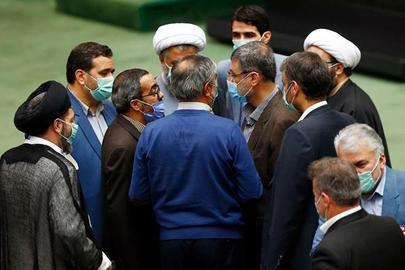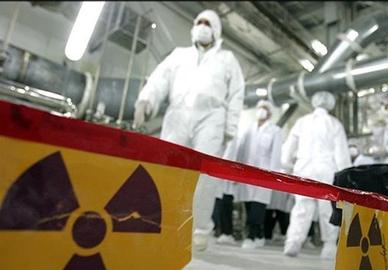Iranian parliamentarians have presented a bill that, if approved, would require the government to reinstate the country’s nuclear program and objectives as they stood prior to Iran joining the nuclear deal, known officially as the Joint Comprehensive Plan of Action (JCPOA). It would also mean that any individual, company or organization not complying with the new law and policy could face a prison sentence. So what will this law mean for foreign relations? And what impact will it have on Iran's internal and international relations?
***
Two days after the assassination of top Iranian nuclear expert Mohsen Fakhrizadeh, emotions ran high in Iran’s parliament, with some politicians, including a senior member of the Ministry of Defense with links to Iran’s nuclear program, chanting "Death to America” and "Death to Israel” during the session.
Several members of parliament proposed a "Strategic Action Plan to Lift Sanctions” as a matter of urgency, the details of which will be debated in public sessions.
The draft proposal was presented quickly, a fact that was evident in the quality of the document. Even draft laws prepared in the early days of the Islamic Republic were not such low quality.
Its introduction is long and informal in style, exposing the authors’ unfamiliarity with legal documents and drafting legislation. This preliminary text sets out an overview of the history of the nuclear program, and the various problems Iran encountered when the JCPOA was implemented.
This draft, divided into nine articles, obliges the government to return the country to its pre-JCPOA status within three months. It is the first time a draft law has stipulated that government officials can be punished with imprisonment if they refuse to comply with a law relating to the nuclear program.
Creating Tensions in Iran and Beyond
The plan, which outlines that Iran should produce 120 kg of enriched uranium with a purity of 20 percent per year, is likely to create significant tensions both within the Islamic Republic and abroad, given that, prior to the JCPOA, this level of production was singled out by the international community as a specific point that needed to be addressed in any agreement. In other words, ensuring Iran did not produce that amount at that purity was one of the key objectives of the JCPOA. The specific reference to the scale of production addresses the exact terms of the JCPOA, which prohibits Iran from manufacturing at such a level.
Under the JCPOA, low-enriched uranium, uranium with a lower purity, can be produced at a level of 500 kilograms a month. This amount and purity is acceptable to the international community and those governments involved with the JCPOA because it makes it more difficult and time-consuming for Iran to produce nuclear weapons. Additionally, according to the bill, production of low-purity enriched uranium should reach 500 kilograms per month, which means, in the views of the international community, it reduces the nuclear breakout time it takes to build a possible weapon.
The proposed legislation further obliges the government to install and activate 1,000 new-generation uranium enrichment machines at Iran’s Fordow facility by March 2021. This is also in direct contravention of the JCPOA, which states that the Fordow facility cannot be used for uranium enrichment processes.
The parliamentarians also call for operations at the Arak heavy water reactor to be returned to pre-JCPOA levels, meaning that the facility must once again be equipped to produce plutonium that could be used in nuclear weapons. Crucially, the bill gives the government three months to suspend the implementation of the Nuclear Non-Proliferation Treaty Additional Protocol if Europe does not purchase oil from the Islamic Republic. European countries have stated that Iranian oil customers are private companies and their governments cannot force them to buy oil from Iran.
The Additional Protocol allows International Atomic Energy Agency (IAEA) inspectors access to Iran's nuclear facilities with as little as a few hours’ notice, and also allows them the opportunity to conduct environmental sampling at non-nuclear facilities if these sites are suspected of being used for that purpose to ensure that radioactive material is not being accessed or in use.
Under the JCPOA, if investigators find evidence of nuclear material at an undeclared facility, they are entitled to request further investigations. Currently, such an investigation is being carried out in Turquzabad, about 30 kilometers from Tehran.
If the new draft bill and its terms are approved and Iran’s nuclear program resumes at pre-JCPOA levels, the international community will be quick to condemn the move.
Non-Compliance Will Mean Suspension and Prison
If the bill is approved by parliament and ratified by the Guardian Council, government officials who fail to comply with it could face up to 10 years in prison and suspension from public service.
The "Strategic Action Plan to Lift Sanctions" refers specifically to "regulatory supervision access beyond the Additional Protocol under the JCPOA,” one of the only official Islamic Republic documents that does so. It obliges the government to suspend its implementation two months after the adoption of the law.
The “supervision access” refers to the IAEA's 25-year monitoring protocol on Iran's natural uranium mines, and access is based on confidential arrangements that have not been shared with the public or parliament. However, the draft bill makes no mention of the fact that there are confidential aspects of the JCPOA , and therefore neither the public nor parliament are equipped with the full details of the agreement, essentially making the emergency bill incomprehensive and flawed, and making it obvious that its advocates hope to push it through quickly and quietly.
The emergency bill stipulates that Iran should return to pre-JCPOA levels of operation no later than three months after the approval of the bill.
An Unexpected Task for Ayatollah Khamenei
Under President Donald Trump, the United States withdrew from the JCPOA in 2018, reimposing some of the country's toughest sanctions on Iran. Trump’s administration claimed Iran had not complied with the agreement, but in fact the Islamic Republic had fully implemented all critical parts of the JCPOA. Specifically, Iran’s compliance with its obligations under the JCPOA included agreeing not to produce enriched uranium with a purity of 20 percent, adhering to the Additional Protocol and allowing IAEA inspections on its facilities. Iran’s nuclear program activities are under the direct supervision of the IAEA.
But the current parliament consists of a high number of Ayatollah Khamenei acolytes; there has never been a parliament so closely aligned to his principles and ideology.
Over the last few years, Ayatollah Khamenei has made it his business to finalize parliamentary resolutions and intervene in Guardian Council decisions. The JCPOA has been no exception. The JCPOA Oversight Board is made up of many politicians loyal to Ayatollah Khamenei. Members include the president, speaker of the parliament, the foreign minister, the defense minister, the head of Iran’s Atomic Energy Organization, the Supreme Leader's two representatives to the Supreme National Security Council, and Ali Akbar Velayati, International Affairs Advisor to the Leader of the Islamic Republic.
The board was set up by Ayatollah Khamenei, and it approves any decision on the JCPOA, including a reduction in the implementation of commitments. If the Supreme Leader decides to reduce Iran’s adherence to obligations under the JCPOA, he may — as he did in the case of the approval of JCPOA — ostensibly present the decision as parliament’s, when in actuality it will have been his decision. Parliament is not qualified or even authorized to make a decision as far-reaching and crucial as ending its commitments to the JCPOA. Certainly, since parliament has often presented obstacles on more trivial matters, Khamenei will not want it to lead on this vital one.
Given Joe Biden's victory in the US presidential election, which could possibly mean the United States’ returning to the JCPOA, it is unlikely that Iran’s leaders will really want to disrupt the current situation by suspending the JCPOA, thereby destroying its only chance of sanctions being lifted, and at the same time attracting further condemnation and criticism from the international community.
visit the accountability section
In this section of Iran Wire, you can contact the officials and launch your campaign for various problems


























comments